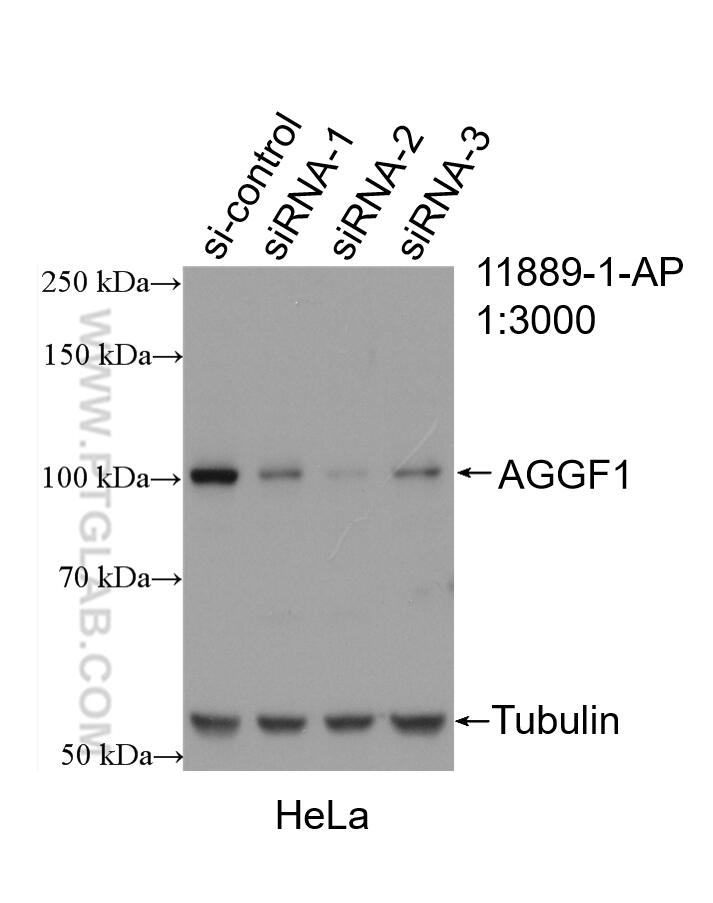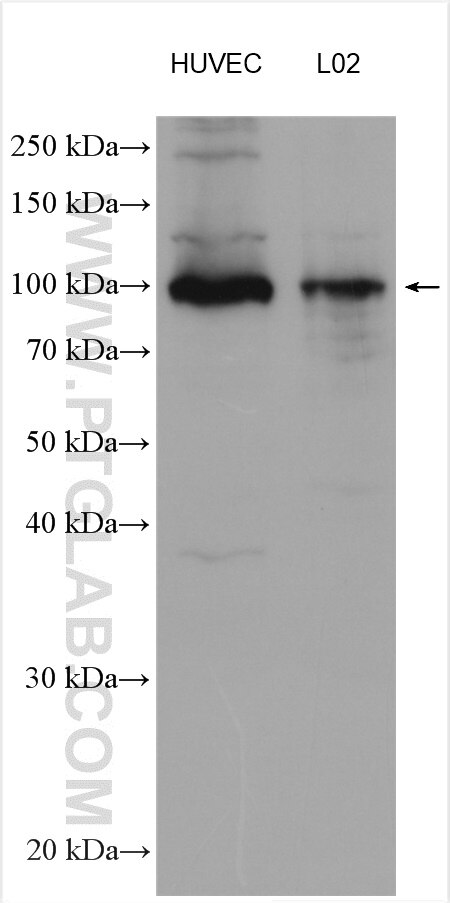Tested Applications
| Positive WB detected in | HUVEC cells, HeLa cells, L02 cells |
Recommended dilution
| Application | Dilution |
|---|---|
| Western Blot (WB) | WB : 1:1000-1:8000 |
| It is recommended that this reagent should be titrated in each testing system to obtain optimal results. | |
| Sample-dependent, Check data in validation data gallery. | |
Published Applications
| KD/KO | See 9 publications below |
| WB | See 21 publications below |
| IHC | See 9 publications below |
| IF | See 5 publications below |
| IP | See 1 publications below |
Product Information
11889-1-AP targets AGGF1 in WB, IHC, IF, IP, ELISA applications and shows reactivity with human, mouse, rat samples.
| Tested Reactivity | human, mouse, rat |
| Cited Reactivity | human, mouse, rat, zebrafish, macaque, rhesus |
| Host / Isotype | Rabbit / IgG |
| Class | Polyclonal |
| Type | Antibody |
| Immunogen |
CatNo: Ag2497 Product name: Recombinant human AGGF1 protein Source: e coli.-derived, PGEX-4T Tag: GST Domain: 4-270 aa of BC029382 Sequence: DMEHTLRIPEVGVSKFHAEIYFDHDLQSYVPVDQGSQNGTIVNGKQILQPKTKCDPYVLEHGDEVKIGETVLSFHIHPGSDTCDGCEPGQVRAHLRLDKKDESFVGPTLSKEEKELERRKELKKIRVKYGLQNTEYEDEKTLKNPKYKDRAGKRREQVGSEGTFQRDDAPASVHSEITDSNKGRKMLEKMGWKKGEGLGKDGGGMKTPIQLQLRRTHAGLGTGKPSSFEDVHLLQNKNKKNWDKARERFTENFPETKPQKDDPGTMP Predict reactive species |
| Full Name | angiogenic factor with G patch and FHA domains 1 |
| Calculated Molecular Weight | 714 aa, 81 kDa |
| Observed Molecular Weight | 84-100 kDa |
| GenBank Accession Number | BC029382 |
| Gene Symbol | AGGF1 |
| Gene ID (NCBI) | 55109 |
| RRID | AB_2305338 |
| Conjugate | Unconjugated |
| Form | Liquid |
| Purification Method | Antigen affinity purification |
| UNIPROT ID | Q8N302 |
| Storage Buffer | PBS with 0.02% sodium azide and 50% glycerol, pH 7.3. |
| Storage Conditions | Store at -20°C. Stable for one year after shipment. Aliquoting is unnecessary for -20oC storage. 20ul sizes contain 0.1% BSA. |
Background Information
The angiogenic factor gene, AGGF1 (or VG5Q), is identified as a candidate susceptibility gene for Klippel-Trenaunay syndrome (KTS) which is a severe congenital disorder characterized by capillary malformations, venous malformations or varicose veins, and hypertrophy of the affected tissues. AGGF1 protein can bind to endothelial cells and promote cell proliferation. AGGF1 shows strong expression in blood vessels and is secreted as vessel formation is initiated. Regulation of AGGF1 by GATA1 may play roles in endothelial cell biology and angiogenesis.
Protocols
| Product Specific Protocols | |
|---|---|
| WB protocol for AGGF1 antibody 11889-1-AP | Download protocol |
| Standard Protocols | |
|---|---|
| Click here to view our Standard Protocols |
Publications
| Species | Application | Title |
|---|---|---|
Nat Commun A non-canonical pathway regulates ER stress signaling and blocks ER stress-induced apoptosis and heart failure. | ||
Mol Ther The 3' Untranslated Region Protects the Heart from Angiotensin II-Induced Cardiac Dysfunction via AGGF1 Expression. | ||
PLoS Biol Angiogenic Factor AGGF1 Activates Autophagy with an Essential Role in Therapeutic Angiogenesis for Heart Disease.
| ||
Arterioscler. Thromb. Vasc. Biol. Angiogenic Factor With G Patch and FHA Domains 1 Is a Novel Regulator of Vascular Injury.
| ||
Mol Ther Nucleic Acids circ-SHKBP1 Regulates the Angiogenesis of U87 Glioma-Exposed Endothelial Cells through miR-544a/FOXP1 and miR-379/FOXP2 Pathways. | ||
FASEB J Angiotensin II increases angiogenesis by NF-κB-mediated transcriptional activation of angiogenic factor AGGF1. |






